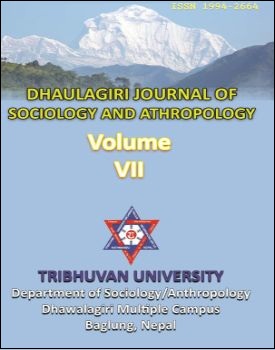Malaria, Tarai Adivasi and the Landlord State in the 19th century Nepal: A Historical-Ethnographic Analysis
DOI:
https://doi.org/10.3126/dsaj.v7i0.10438Keywords:
Dhimal, Malaria, Landlord state, the Tarai, state geography of extractionAbstract
This paper examines the interplay between malaria, the Tarai Adivasi and the extractive landlord state in the 19th century Nepal by focusing on Dhimal, one indigenous community from the easternmost lowlands. Throughout the 19th century, the Nepali state and its rulers treated the Tarai as a state geography of extraction for land, labor, revenue and political control. The malarial environment of the Tarai, which led to the shortage people (labor force), posed a major challenge to the 19th century extractive landlord state and the landowning elites to materialize the colonizing project in the Tarai. The shortage of labor added pressure on the malaria resistant Tarai Adivasi to reclaim and cultivate land for the state. The paper highlights the need for ethnographically informed social history of malaria in studying the changing relations between the state and the ?div?si communities in the Tarai
DOI: http://dx.doi.org/10.3126/dsaj.v7i0.10438
Dhaulagiri Journal of Sociology and Anthropology Vol. 7, 2013; 87-112




